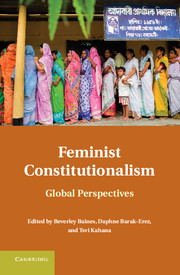Book contents
- Frontmatter
- Contents
- Foreword
- Contributors
- Introduction
- Part I Feminism as a Challenge to Constitutional Theory
- Part II Feminism and Judging
- Part III Feminism, Democracy, and Political Participation
- Part IV The Constitutionalism of Reproductive Rights
- 14 Pregnancy, Equality, and U.S. Constitutional Law
- 15 Federal Spending and Compulsory Maternity
- 16 Challenges for Contemporary Reproductive Rights Advocacy
- Part V Women's Rights, Multiculturalism, and Diversity
- Part VI Women between Secularism and Religion
- Index
- References
16 - Challenges for Contemporary Reproductive Rights Advocacy
The South African Example
Published online by Cambridge University Press: 05 June 2012
- Frontmatter
- Contents
- Foreword
- Contributors
- Introduction
- Part I Feminism as a Challenge to Constitutional Theory
- Part II Feminism and Judging
- Part III Feminism, Democracy, and Political Participation
- Part IV The Constitutionalism of Reproductive Rights
- 14 Pregnancy, Equality, and U.S. Constitutional Law
- 15 Federal Spending and Compulsory Maternity
- 16 Challenges for Contemporary Reproductive Rights Advocacy
- Part V Women's Rights, Multiculturalism, and Diversity
- Part VI Women between Secularism and Religion
- Index
- References
Summary
Introduction
South Africa's Choice on the Termination of Pregnancy Act of 1996 (CTOPA) is heralded as one of the most progressive abortion laws in the world. An outlier from its African counterparts, the CTOPA gives a woman of any age the right to a government-funded abortion until the twelfth week of pregnancy. Women's rights activists, as part of the South African movement to eradicate the discriminatory policies of apartheid and to incorporate international human rights norms, exerted significant influence in drafting the CTOPA and rights in the Constitution. Reflecting a leading strategy in reproductive health advocacy, proponents of the CTOPA relied on the autonomy and equality rights expressed in documents agreed to at the International Conference on Population and Development (ICPD) in 1994 and the Fourth World Conference on Women (FWCW) in 1995. The CTOPA is emblematic, in this way, of the recognition of the modern relationship between reproductive health care, including abortion, and women's human rights.
The implementation of the CTOPA, however, is not as inspiring. The number of illegal terminations has not changed significantly since the CTOPA's enactment. Although rates of maternal mortality associated with illegal abortion have decreased, indications of maternal morbidity (illness or negative health effects) remain fairly constant. Contradicting the expectations of the CTOPA's drafters, the passage of a law that enunciates a right to abortion services has not substantially improved women's reproductive health.
- Type
- Chapter
- Information
- Feminist ConstitutionalismGlobal Perspectives, pp. 298 - 314Publisher: Cambridge University PressPrint publication year: 2012
References
- 1
- Cited by



